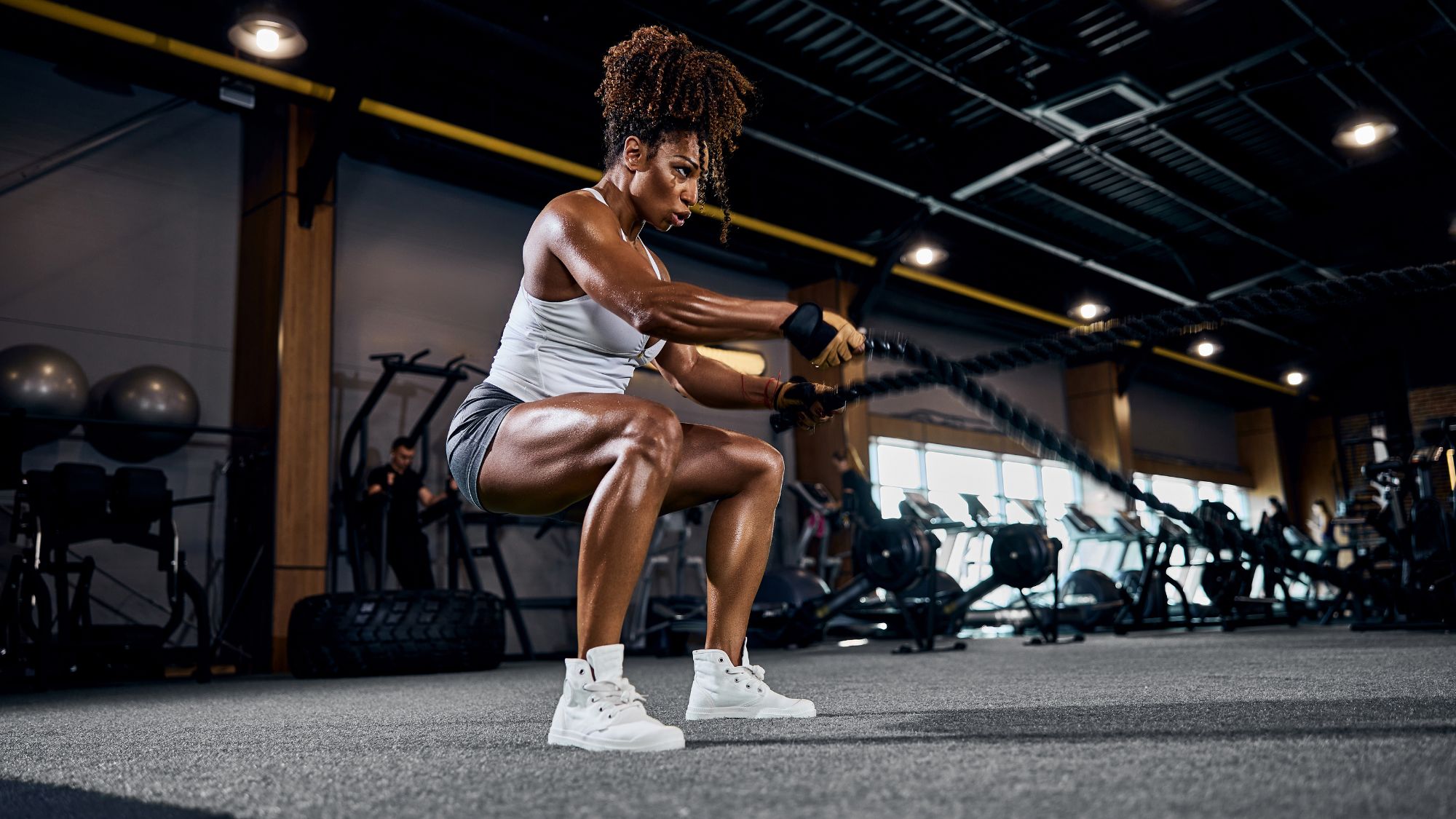Exercising more and feel like you’re not seeing progress? This could be why
Spoiler alert: your scale weight is not the end-all you think it is.


If you've been weight training recently, you've no doubt heard that muscle weighs more than fat. It's a well-touted piece of fitness information, spread by personal trainers, friends and people on social media to explain why progress - as measured by the scale - often halts. But is there any truth to the idea that muscle and fat weigh differently?
First of all, it's important to remember that weight is not really the be-all and end-all. The number on the scale is simply a sign of gravity and there are many studies that show weight doesn't equate to your health (one piece of research found weight loss diets had minimal improvements on health outcomes including cholesterol, blood pressure and fasting blood glucose and none of these changes were correlated with weight changes) - and it certainly doesn't equate to your worth.
But saying that, your weight has become a standardised way of tracking progress. If you've recently started exercising then you may have set yourself the goal of dropping some pounds which you monitor frequently by stepping on the scales. But if that age-old proverb about muscle and fat is to be believed, how might that impact your progress?
Below, top experts share their take once and for all. Not sure how long it takes for women to build muscle? Read our expert-led explainer. And if you're on the hunt for workout moves to try, don't miss our guides to ab exercises, resistance band exercises, and dumbbell exercises, while you're here. Our explainer on how much weight should you start lifting might come in handy, too.
You asked, we answered: does muscle weigh more than fat?
In short, the answer is yes. "Muscle and fat do weigh the same in that one kilo of muscle weighs the same as one kilo of fat," explains personal trainer Dottie Fildes. "However, muscle is denser than fat, which means one kilo of muscle takes us a much smaller surface area than one kilo of fat."
Another way to explain this would be if you filled a bowl full of muscle (stay with me on the visuals here) and the same-sized bowl full of fat, the bowl of muscle would weigh more. The denser the material, the less volume of it you need for it to weigh the same amount.
This is likely why those who start a new exercise routine don't see huge changes on the scale, says Fildes. "If you're strength training or using your body a lot, you are likely building muscle and losing fat. That means, despite looking smaller or feeling better, the number on the scale could be the same," she explains.
Celebrity news, beauty, fashion advice, and fascinating features, delivered straight to your inbox!
Is scale weight a good way to measure fitness progress?
For this reason, the scale isn't an accurate form of progress. Working out a lot and building muscle might mean that the number on the scale doesn't change - it might even go up. That doesn't mean what you're doing is a waste of time: you are building strength, improving your fitness and building healthy habits.
Growing your muscle mass is so good for your health. Studies show having more muscle is associated with improved blood sugar control, reduced back pain and injury, as well as increased power, strength and confidence. All that's to say, if you are considering not working on your strength for fear of the scales, please think again.
One way to counteract negative thoughts about weight gain while exercising might be to use a body fat scale. These are scales that measure your body composition rather than just your body weight, an arguably more important element of health. Your composition refers to the percentages of body fat, muscle mass and some scales can even measure your water weight.
"It's very difficult to tell muscle and fat apart on a normal scale, so unless you are visibly seeing muscle growth then muscle mass scales can be handy. However, these are often inaccurate and should be used as a guideline rather than a direct reflection of exactly how much fat and muscle you have," says Fildes.
5 best ways to track fitness progress
Overall, there are so many better ways to track your fitness progress than just standing on the scale, says Fildes. Here are some of the elements she recommends tracking:
1. Resting heart rate
Your resting heart rate is how fast your heart beats when you're sat still - not exercising or moving around. In general, a low resting heart rate is a good sign of fitness as it means your heart has a powerful pump that transports oxygen around the body efficiently (but beware that too low can be a sign of under eating or over training). According to the US Department of Health and Human Services, a 'very good' resting heart rate for a woman aged up to 39 is 60-69 beats per minute, while the average is 76-83. Focus less on specific numbers though and more on trends: you can measure your resting heart rate on a smartwatch and, if you see it lowering as you continue on your exercise journey, it's a good sign that you're becoming fitter.
2. Exercise consistency
"If you are maintaining consistency with your routine, whether that's two sessions a week or daily walks, that's a great sign of you progressing and improving your health," says Fildes.
3. Exercise performance
If you're trying to build strength then the best way to track that is by monitoring how much you lift. That can be measured in the form of weight on the bar or the number of reps you lift for. If it's cardiovascular improvements you're looking for, then measure how long you can run without rest or how fast you manage to complete your cycle, circuit or jog.
4. How your clothes feel
Remember that muscle takes up less room than fat? "If you're weighing the same but your clothes are fitting a little bit looser then that is a clear sign your body composition is changing," says Fildes.
5. Your mental health
Maybe you're feeling less anxious or more confident in your day-to-day life or even more able to get through a workout without feeling judged or uncomfortable. These are huge signs that exercise is having potent mood-boosting effects on you.
Why does muscle weigh more than fat?
As above and as personal trainer Dottie Fildes explains, because muscle is denser than fat. "This means one kilo of muscle takes us a much smaller surface area than one kilo of fat."
Know this, though: there are many, many more ways to track your progress than just checking in on what you weigh. Before stepping on the scales, it's likely worth asking yourself: what am I trying to prove by checking my body weight? If the answer is your health, fitness or worth - it's probably best to stop and find other ways to check in on your progress.

Chloe Gray is a freelance journalist who writes and talks about health, fitness, and wellbeing through a feminist lens. She was part of the launch team for Stylist magazine's fitness brand, Strong Women, and has written for i news, Women's Health, Red magazine, Good Housekeeping, Refinery29, and more. She's all about building mental and physical strength, eating delicious food that fuels you well, and making the fitness industry more accessible and enjoyable. She's also a qualified fitness trainer and research nerd, so you can be sure everything you read is backed by proper science.